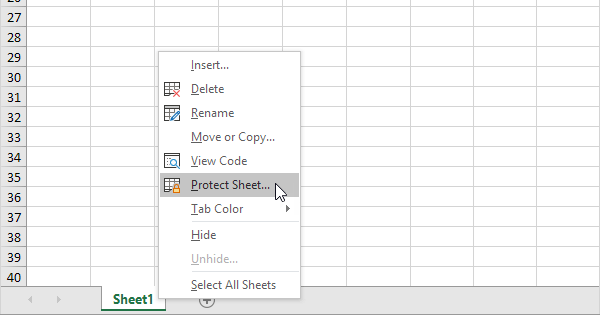Unlock Your Excel Sheets: Password Protection Guide

Securing your Excel spreadsheets with passwords is a standard practice for protecting sensitive information. But what happens when you need to unlock these sheets? Whether you've forgotten your password, or you're trying to access someone else's password-protected file, understanding how to bypass Excel sheet protection is useful. This guide will walk you through various methods to unlock Excel sheets, offering both ethical approaches and addressing common user questions.
Why You Might Need to Unlock Excel Sheets

Before diving into the unlocking methods, it’s important to understand why you might need to unlock an Excel sheet:
- Lost Password: The most common scenario is simply forgetting your password.
- Legacy Files: You might have to access files created by former employees, where passwords are no longer known.
- System Upgrade: Sometimes, compatibility issues arise when transferring files between different versions of Excel.
Methods to Unlock Excel Sheets

Official Unlocking Method

Microsoft provides an official way to unlock an Excel sheet:
- Open Excel.
- Press Alt + F11 to open the Visual Basic Editor.
- In the Project Explorer, double-click on the workbook name to open the code window.
- Enter the following code:
Sub PasswordBreaker() Dim i As Integer, j As Integer, k As Integer Dim l As Integer, m As Integer Dim i1 As Integer, i2 As Integer, i3 As Integer, i4 As Integer Dim i5 As Integer, i6 As Integer, i7 As Integer, i8 As Integer Dim i9 As Integer, i10 As Integer, i11 As Integer, i12 As Integer On Error Resume Next For i = 65 To 66: For j = 65 To 66: For k = 65 To 66 For l = 65 To 66: For m = 65 To 66: For i1 = 65 To 66 For i2 = 65 To 66: For i3 = 65 To 66: For i4 = 65 To 66 For i5 = 65 To 66: For i6 = 65 To 66: For i7 = 65 To 66 For i8 = 65 To 66: For i9 = 65 To 66: For i10 = 65 To 66 For i11 = 65 To 66: For i12 = 65 To 66 ActiveSheet.Unprotect Chr(i) & Chr(j) & Chr(k) & _ Chr(l) & Chr(m) & Chr(i1) & Chr(i2) & Chr(i3) & _ Chr(i4) & Chr(i5) & Chr(i6) & Chr(i7) & Chr(i8) & _ Chr(i9) & Chr(i10) & Chr(i11) & Chr(i12) If ActiveSheet.ProtectContents = False Then MsgBox “Password is ” & Chr(i) & Chr(j) & Chr(k) & _ Chr(l) & Chr(m) & Chr(i1) & Chr(i2) & Chr(i3) & _ Chr(i4) & Chr(i5) & Chr(i6) & Chr(i7) & Chr(i8) & _ Chr(i9) & Chr(i10) & Chr(i11) & Chr(i12) Exit Sub End If Next: Next: Next: Next: Next: Next Next: Next: Next: Next: Next: Next Next: Next: Next: Next: Next: Next End Sub - Run the macro by pressing F5. The macro will attempt all possible combinations of lowercase letters.
🔍 Note: This method uses VBA to crack the password, which might be slow and not guarantee finding the actual password used, but rather an equivalent one.
Third-Party Software Solutions

If you’re not comfortable with VBA or need a faster approach, third-party software can be a good alternative:
- Excel Password Recovery Tools: Programs like PassFab for Excel, Excel Unlocker, or Free VBA Password Remover can recover passwords. Remember, these tools might not always respect ethical considerations or user agreements with Excel.
⚠️ Note: Using third-party software to recover passwords might violate terms of service or privacy concerns, so ensure you have the right to unlock the document.
Other Important Points

Legal and Ethical Considerations

Unlocking someone else’s Excel sheet can have legal and ethical implications:
- Authorized Access: Ensure you have legal permission to unlock the sheet.
- Privacy: Respect privacy; unauthorized access can lead to legal issues.
Best Practices

To mitigate future issues:
- Use Strong Passwords: But remember them or store them securely.
- Save Password in a Secure Place: Consider using password managers.
Regular Backup

Always back up your Excel files, especially if they’re important. This can save you from needing to unlock the sheet:
- Regularly backup your workbooks to external drives or cloud storage.
Understanding how to unlock Excel sheets can be crucial for both personal and professional data management. This guide has provided you with several methods to access password-protected spreadsheets, from using official methods like VBA macros to exploring third-party tools. Always remember to handle sensitive information responsibly, keep your passwords secure, and ensure you have the proper authorization to access the files you're trying to unlock. By following best practices like using strong passwords and backing up your data, you'll reduce the frequency of needing to unlock sheets, making your Excel experience smoother and more secure.
Is it legal to unlock someone else’s Excel sheet?

+
Unlocking someone else’s Excel sheet without authorization is generally illegal, as it breaches privacy and data protection laws. Always ensure you have the legal right to access the sheet.
Can I recover my lost Excel password?

+
If you’ve forgotten your Excel password, you can use methods like the VBA macro or third-party recovery tools, but there’s no guarantee of recovering the exact password used initially.
What are the risks of using third-party tools?

+
Third-party tools can pose security risks, including malware, privacy concerns, and the possibility of violating Excel’s user agreement. Always ensure you download from reputable sources and understand the terms of use.



